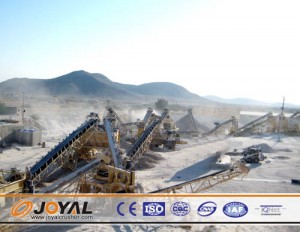

— How to choose a proper rock crusher
 No matter how you process your gold, silver, or copper ore, crushing is the first step. It takes the rock from whatever size it was when it left the mine and processes it to a size that allows any valuable minerals to be extracted. Problems in the crushing process can dramatically reduce recovery rates and even cause damage to equipment downstream in the processing cycle. Just as important, poor crushing can dramatically increase the cash cost of your final product.
No matter how you process your gold, silver, or copper ore, crushing is the first step. It takes the rock from whatever size it was when it left the mine and processes it to a size that allows any valuable minerals to be extracted. Problems in the crushing process can dramatically reduce recovery rates and even cause damage to equipment downstream in the processing cycle. Just as important, poor crushing can dramatically increase the cash cost of your final product.
The two best known crusher types are the jaw crusher and the cone crusher. The jaw crusher, or toggle crusher works on a cam mechanism where the material is progressively crushed smaller and smaller as it travels into the crusher and out the bottom. Since not all the crushing is done in one stroke, the movement of the jaw can be quite small.
The second major type of crusher is the cone crusher or gyratory crusher. It has two cones that crush the material. There are also impact crushers, which were popular in the Western mining days, and roller crushers.
Although every crusher has its own strengths and weaknesses, there are several factors that experts ask you to consider before picking the crusher for your operations. These will help determine the best design for you.
IS THE CRUSHER HEFTY ENOUGH FOR YOUR NEEDS? Crushing is a brute force operation and the power input and vibration can wreck a poorly made machine. Cheaper machines can “skimp” on the metal that is necessary to withstand the vibration and eventually stress cracks will form. The same holds with repairs. A good crusher repair facility will charge more, but make sure the repairs will stand up to stress according to P.R. Engineering.
HOW GOOD IS YOUR BLASTING CREW? Miners say that it is easier to break up ore in the ground than in a crusher. That’s why blasting can be critical. A well prepared shot can even eliminate one crushing process, which will lower crusher costs and improve processing speed. You may find an investment in blasting software and the right blasting agent will be cheaper than a bigger crusher.
CAN THE CRUSHER HANDLE THE MAXIMUM CAPACITY WITHOUT UNDUE STRAIN? Don’t think you can overload your crusher without paying a penalty. If you are overloading your crusher, you are dramatically increasing your maintenance costs and shortening the life of the machine. If you foresee times when you will have to push more material through your crushing process, you should either buy a bigger machine, or invest in an additional crusher that can handle the extra material. This machine can either be a used crusher or one of the cheaper ones.
CAN THE MACHINE HANDLE THE LARGEST POSSIBLE LUMP SIZE? One oversized piece of rock can wreck a crusher. In that case, you might want to buy a better machine that can handle oversized material or invest in your blasting team so you get better uniformity in the shot process.
WILL THE MACHINE PRODUCE TOO MANY FINES. Obviously, you don’t want fines if your process doesn’t call for them. But, even if you need to produce a fine powder, you don’t want it to come out of your crusher. These fines will add to your dust control problem and may require additional dust control equipment, which will cost more money and require additional engineering. Fines also have a way of gumming up or abrading equipment, which will add to maintenance costs. And, don’t forget that airborne dust means health issues.
HOW MUCH NOISE AND VIBRATION WILL THE CRUSHER PRODUCE? Vibration means the crusher is undergoing stress, which can lead to increased maintenance and reduced life. The noise means safety issues like ear protection. It also contributes to accidents because constant noise contributes to worker fatigue.
HOW DOES YOUR CRUSHER HANDLE YOUR SPECIFIC MATERIAL? This is important but often forgotten in the search for a good deal. Tough, abrasive, corrosive or sticky material all has different requirements and problems. A crusher designed for one material maybe totally wrong for another.
IS THE MACHINE SUITABLE FOR YOUR WORKING CONDITIONS? Mining conditions in the US range from below zero to over 100 degrees and from bone dry to humid. In fact, material can act different in varying conditions, which means that the wrong crusher can provide different results in different conditions.
Want to get more information about Stone crushing plant ?